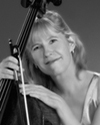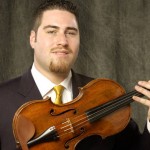Convivial Chameleon opens season in high spirits
Halfway through a spirited reading of the Schumann Piano Quartet, violist Michael Klotz turned to the audience just before his fellow Chameleon musicians began the slow movement.
“This is one of the most beautiful pieces ever written,” Klotz said, referring to the Andante cantabile, and that we’re-among-friends moment says a lot about the Chameleon series, which opened its seventh season Sunday afternoon at the Leiser Opera Center in Fort Lauderdale.
Cellist Iris van Eck launched her chamber music series, which has mostly involved pieces for strings, back in 2002, and it has retained a loose, convivial feel that serves the audience well and showcases dedicated musicians doing what they love to do best. These are professionals who play more like enthusiasts than veteran players numbed by routine.
For the first of her four seasonal programs, Dutch-born van Eck programmed along with the Schumann Quartet, early string trios by Schubert (in B-flat, D. 471) and Beethoven (in C minor, Op. 9, No. 3). She also took a turn in the solo spotlight with the second of three solo cello suites written by Max Reger, all three of which she will record in December.
The two trios featured van Eck, Klotz and violinist Misha Vitenson. They make a strong unit; all three are fine players, and they can be heard to good individual as well as group effect. The Schubert trio, a one-movement work written when the composer was only 19, pays homage to its Mozart and Haydn models but has a powerful melodic profile that announces a strong new voice. Ensemble here was tight and springy, which gave the group’s reading of the piece an admirable freshness.
The Beethoven trio also announces the arrival of a significant composer, one for whom a restless, brusque energy is not only important but crucial to narrative structure. Here, too, the ensemble was clean and vigorous, and advocated well for Beethoven’s intentions. Particularly notable was the tension each player brought to his and her iterations of the three-note motif that drives the argument of the first movement, and Vitenson’s deft handling of the elaborate, aria-like figurations of the slow movement.
The Schumann Piano Quartet in E-flat that occupied the second half of the concert also abounded in high spirits. Pianist Misha Dacic joined van Eck, Klotz and Vitenson for this popular, appealing work, and once again sheer joy in music-making was much in evidence. Things seemed slightly out of balance in the third movement, though, as pianist Dacic tended to play his accompaniment figures a bit too loud for the other players, overwhelming the lovely tune. Schumann’s writing there (particularly in the staccato passages) is often thick and when played on a modern concert grand can easily drown out the strings.
Van Eck told the audience she had fallen in love with the three Reger suites this summer as she prepared them for a recording. Reger is a composer who, after years of critical derision and absence from concert programs, is now getting more frequently played and recorded. Van Eck played the second of the three suites, in D minor, a four-movement work that looks back to Bach, who was Reger’s compositional lodestar.
This is a beautiful work, quite severe in its opening movement (a slow Preludium) and very Bachian indeed in its second movement Gavotte and its closing Gigue. The third movement Largo has one of those endless, long-breathed melodic lines, and, overall, it’s a piece that deserves to be in the repertory of serious cellists.

Van Eck is a fine player with a considerable technique who produces a focused, intense tone color, and she made a persuasive case for the suite. Still, this is a very difficult piece and at times van Eck ran into trouble, especially in the double and triple stop passages of the first movement, which weren’t satisfactorily in tune. She also seemed to be trying too hard throughout to make an impact with the piece and often played with a noticeable stiffness, suggesting that while she may have the piece in her fingers, she doesn’t feel entirely comfortable with it yet.
Van Eck is taking an important stand for the cello repertoire by performing and recording these works, and she should be commended for it. But the music itself needs to breathe a bit more in her hands, and it may take a few more outings with the suites in public before that happens.
The Chameleon series resumes at 3 p.m. Sunday, Jan. 18, 2009, when van Eck will be joined by pianist Kemal Gekic for music by Prokofiev, Mendelssohn, Locatelli and Ginastera. Single tickets are $30 and can be had by calling 954-761-3435 or visiting www.chameleonmusicians.com.
Greg Stepanich has covered classical music, theater and dance for 25 years at newspapers in Illinois, West Virginia and Florida. He worked for 10 years at The Palm Beach Post, where he was an assistant business editor and pilot of Classical Musings, a classical music blog. He now blogs for the Palm Beach ArtsPaper at www.pbartspaper.com and at classicalgreg.wordpress.com. He also works as a freelance writer and composer.
Posted in Performances
Leave a Comment
Mon Dec 1, 2008
at 12:36 pm
No Comments







